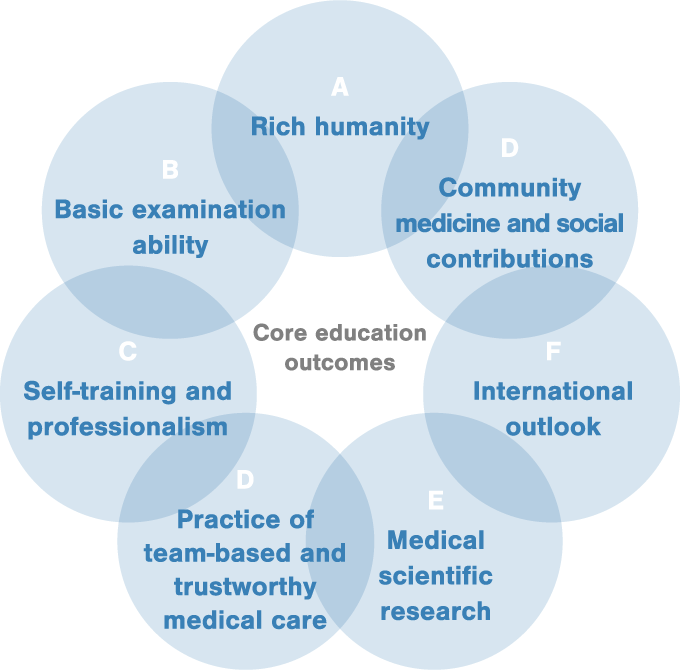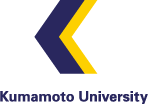- HOME
- OBE
OBE
Education Outcomes of the School of Medicine of Kumamoto University
In recent years, the move to Outcome-Based Education (OBE) has become a trend in medical education across the world. Outcome-Based Education in medical education clarifies the abilities (education outcomes) that graduates of the School of Medicine should acquire and has developed a curriculum designed to help students develop those abilities. Thus, achieved education outcomes are being emphasized rather than educational processes, which requires maintaining high-quality medical education.
To determine the education outcomes of the School of Medicine of Kumamoto University, a medical education FD workshop was held in September 2013, at which a draft of education outcomes of the School of Medicine of Kumamoto University was prepared. The draft was discussed and revised by the Curriculum Planning Evaluation Committee, Education and Curriculum Committee, and at the School of Medicine Meeting, and approved in June 2014.
The Education Outcomes consist of seven categories of core education outcomes. Within these categories, more specific education outcomes are established in 50 subcategories.
Furthermore, a chart has been prepared that shows how existing lectures and practical trainings help students of the School of Medicine achieve the education outcomes. The lectures and practical trainings are categorized into six levels (from “A: Develops the ability to practice in clinical and research settings” to “F: Offers no opportunity to achieve the outcome”) in helping achieve each education outcome.
We hope the faculty, staff and students of the School of Medicine fully understand the education outcomes, and use them in assisting students of the School of Medicine to achieve the education outcomes before graduation. We also welcome any advice on how to continue improving our outcome-based medical education.
Education Outcomes of the School of Medicine of Kumamoto University
Approved at the School of Medicine Meeting on June 25, 2014

Education outcomes
- A. Rich humanity
- Graduates of the School of Medicine of Kumamoto University can understand the feelings of sick people and their families.
- Apply social norms and common sense to their actions, and comply with laws, regulations, and rules.
- Be able to respect the viewpoints of patients and their families, and give sincere, altruistic and empathetic response.
- Be able to respond with consideration given to the psychological, social, and cultural background of patients and their families.
- Be able to explain the cultural and social factors that influence medical sciences and medical care.
- Understand why and when humanity is needed when acting as an organizational leader.
- B. Basic examination ability
- Graduates of the School of Medicine of Kumamoto University possess practical abilities to systemically see the whole body with integrated knowledge, skills and attitude that are best-suited for medical doctors. They understand diagnostic and treatment theories about a broad range of diseases, and use parts of them when applicable.
- Communication
-
- Be able to explain the normal structure, functions, embryogenesis, development, growth, aging, death, psychology, and actions of humans.
- Be able to explain about causes, medical conditions, natural history, risk factors, and prevention of diseases.
- Be able to explain about treatment principles (pharmacologic therapies, radiation therapies, surgical treatments, etc.).
- Be able to explain about epidemiology, demography, environments, and behavioral science.
- Practice of medical care
-
- Be able to obtain an accurate major medical history from patients, including their psychological and social backgrounds, showing consideration for them.
- Be able to appropriately perform examination maneuvers of adults and children.
- Be able to compile problem lists, make differential diagnoses, and create medical records (including electronic medical records).
- Be able to choose properly among clinical examination, specimen testing, imaging examination, and pathological diagnosis for diagnosing and treating diseases, and interpret the results.
- Be able to plan disease diagnoses and treatments considering the priority based on patients’ backgrounds and medical evidence.
- Be able to take part in long-term follow-up and rehabilitation of chronic diseases.
- Be able to take part in emergency care and intensive care.
- e able to take part in primary care.
- Understand the outline of palliative care and terminal care.
- Understand the outline of patient education.
- C. Self-training and professionalism
- Graduates of the School of Medicine of Kumamoto University pursue a career as medical doctor or medical researchers, and aim to continue self-learning throughout their life. They have high ethical standards, and fully understand their duties as a doctor who protects the dignity of life, human lives, and health.
- Self-training
-
- Be able to evaluate their current situation, and set goals.
- Be able to devise methods to achieve their own goals, and continually do self-learning.
- Be able to design their career, and continue learning toward achievement in order to enhance personal development.
- Professionalism
-
- Commit themselves to providing the best treatment for a patient.
- Be able to deal with patients by always taking responsibility for their own knowledge, skills, and actions.
- Be able to understand ethical issues, and act according to ethical principles.
- Be able to understand ethical issues, and act according to ethical principles.
- Be able to appropriately control and use information.
- D. Practice of team-based and trustworthy medical care
- Graduates of the School of Medicine of Kumamoto University understand that the practice of medicine focuses on the patient and implemented by a team comprising multidisciplinary health care providers. They have communication skills to build good relationships with patients, their families, and team members. They understand that medical safety and informed consent are important in order to be trusted by patients.
- Communication
-
- Understand and be able to practice basic communication skills.
- Team-based medical care
-
- Understand the specialty of each health care profession, and be able to explain about their roles in team-based medicine.
- Understand that communication is important for developing trusting relationships with other doctors and other professions.
- Medical care trusted by patients
-
- Be able to build good patient-doctor relationships for practicing medicine.
- Be able to maintain good communication with patients and their families.
- Understand the importance of informed consent.
- Be able to implement the use of medicines that secure patients’ safety.
- Be able to explain about the safety of medicines and risk management.
- E. Medical scientific research
- Graduates of the School of Medicine of Kumamoto University possess a strong sense of exploration in science. They understand the basics of medical scientific research, and can perform logical and objective evaluations of existing research results. They also can extract issues relating to modern medicine, and plan research to solve issues, according to ethical principles.
- Understand scientific theories and methodologies underlying medical findings.
- Understand ethical matters concerning basic research and clinical research.
- Be able to appropriately collect information from academic papers and other sources, extract unsolved medical scientific issues, and develop hypotheses.
- Be able to conduct research in medical scientific areas in which they are interested according to a plan they designed and under supervision.
- Be able to clearly explain new findings, and perform logical and objective evaluations.
- F. International outlook
- Graduates of the School of Medicine of Kumamoto University have a broad view of society, and understand the current situations of medicine and health care in Japan and in international society.
- Have English skills sufficient to share information in international society.
- Have a will to contribute to domestic and international society.
- Understand the current situation of medicine and health care in international society.
- Understand that medical scientific and medical care research and development contribute to international society.
- G. Community medicine and social contributions
- Graduates of the School of Medicine of Kumamoto University understand the current situation and issues of community medicine. To contribute to improving the health of local inhabitants, they have knowledge, skills and attitude in collaborating and cooperating with local health care, medical care, welfare, and elderly care services and administrative bodies.
- Understand various medical systems such as health insurance systems.
- Understand the importance of properly using local health care, welfare, and elderly care services to maintain and improve the health of patients and their families.
- eize control of issues related to local health and welfare, and acquire the knowledge needed to develop disease prevention plans.
- Understand the necessity of practicing community medicine to contribute to society.
- Understand that medical scientific and medical care research and development contribute to society.
- Understand the practice of community medicine in Kumamoto Prefecture through cases specific to the prefecture.

